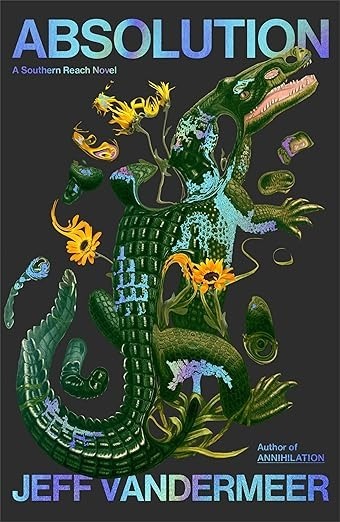This prequel to the Southern Reach trilogy breaks every rule – unsurprising for Jeff VanderMeer, the king of new weird fiction

Absolution (Fourth Estate) by Jeff VanderMeer
Prequels often feel unnecessary; they indulge in gratuitous over-explication of things that never needed to be explained. Not so with Jeff VanderMeer’s Absolution, a prequel to his Southern Reach trilogy which deliberately scrambles chronology and sequence to deny the possibility of origin, backstory and explication.
The Southern Reach trilogy was published simultaneously in 2014 and is now considered a pioneering work of what M. John Harrison has called “new weird” fiction, mixing elements of science fiction, fantasy and horror to create layered and deliberately alienating texts. The first of the novels was adapted for the screen by Alex Garland in the 2018 film Annihilation (the titles are alliterative: Annihilation, Authority, Acceptance).
While describing a plot that seeks to erase its own narrative progress may seem a little futile, the novels are broadly about a mysterious event in the 1990s that transforms a section of swampy coastline, possibly in Florida or possibly in the Pacific Northwest, into something else: Area X. Teams of researchers from the mysterious government agency Central are sent in to cross the Border into Area X and are themselves transformed in obscure ways – changed into animals or monsters or doppelgangers of themselves. The expeditions learn little about this mysterious zone where the laws of nature don’t apply – an area which, over the course of the three novels, begins to grow.
Absolution is split into three sections taking place in three timelines: 20 years before the Border, 18 months before the Border, and during the first Border crossing. These specific chronological markers, though, exist mostly to be blurred and undermined. Rabbits wearing cameras, sent to study the Border, show up in Absolution decades before Area X is supposed to exist, but seemingly transformed by it – turned into meat-eaters, devouring crabmeat and then each other. Old Jim, a Central agent, discovers a diagram on a wall in an abandoned building which seems to outline the forthcoming “plot” of the rest of the books. Jim muses that the “future” is “colonising the past, as if every moment had a permeability that could neither be desired or controlled, like an outstretched hand with the water draining off the sides back into the river.”
The reference to colonisation is an important hint. In his 2008 study Colonialism and the Emergence of Science Fiction, John Rieder pointed out that in science fiction narratives, colonising territory is often framed as colonising the past, since other cultures are supposedly further back along the Darwinian/evolutionary timeline. The notion of progress and linear advancements into the future becomes a way to distinguish between us (advanced, intelligent, worthy to rule) here and them (primitive, worthy of subjugation) over there.
In the first three Southern Reach novels, the distinction between here and over there is blurred and swallowed. People enter Area X and discover a doppelganger of themselves, already across and staring back. The borders collapse and move and seem to transpose themselves across great distances. In Absolution, not just space but time melts down. Cameras replay scenes that never happened; walkie-talkies turn themselves on and start speaking nonsense from nowhere.
The last section of the book is told from the point-of-view of Lowry, a drugged-out and narcissistic military specialist who is part of the first expedition. We know little about Lowry’s background; his main characteristic is that he says “fuck” so often that it turns into a kind of narrative chaff. You follow his exploration of Area X through a haze of sexual and perceptual frustration that mirrors and intensifies the expedition’s own perplexity, as when he laments the inadequacy of his colleague’s expertise: “Fuckable fucking fucked fuck future terminology for college degrees that fucking fell fuck apart in the fuck field like fucking paper bags filled with fuck water.”
Is Area X a mystery because of its own mysteriousness, or because of the scientists and spies attempting to investigate and categorise? Are the book’s readers agents like Old Jim, who along with him “Sift through thin lines of dead seaweed and barnacles to know your future, or maybe just your past”? Like the trilogy, Absolution creates layers of words and speculations that mock and infiltrate any attempt at interpretation.
The pleasure of the novel is precisely this sense of being overwhelmed, of “scrabbling” with the “panic of fifty spasming rabbits” at a cage of crabmeat and old memos. H.P. Lovecraft would infamously tell the reader that the nameless things out there were indescribable, but VanderMeer sets out to actually make the reader feel like their cognition is being leached away. The author could be referring to his own work when he describes some of the Central biologists’ journals as expressing “a descent into a vast internal void, a kind of babbling nothing”. That’s a description of horror. But in the freedom from borders in time and space, it also feels like a kind of absolution.
This article is from New Humanist’s winter 2024 issue. Subscribe now.


